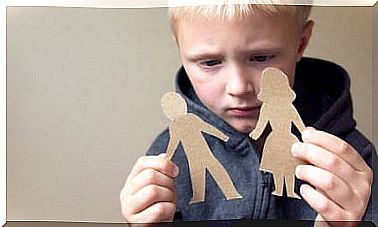Emotional Reasoning: What Is It And What Are Its Consequences

Do you know what it is to feel a reality with intensity without there being any basis to support it? Then you know first-hand what one of the most perplexing psychological problems involves, a common problem known as emotional reasoning.
Emotional reasoning is a term that tries to describe a particular type of cognitive distortion. This term was first used in the 1970s by Aaron Beck, the founder of Cognitive Therapy.
According to Beck, every time someone concludes that their emotional reaction defines their reality, emotional reasoning occurs. Thus, any observed evidence is discarded or relegated to the background in favor of the supposed “truth” shaped by one’s own feelings. In addition, Beck believed that this reasoning originated in negative thoughts, which were also involuntary, uncontrollable or automatic.
Feelings are not facts
Emotional reasoning assumes that what you feel must be true (eg, if you feel sad, it must be true that fortune does not smile on you, that you are unfortunate). And while it is often helpful to get in touch with your own feelings, what you feel can be quite different from what you are actually going through.

The strength of the feeling creates conviction, which is maintained normally until the emotional storm begins to fade . When we use emotional reasoning, we believe in automatic thoughts that cause emotional distress, and then we try to reason based on our feelings.
Therefore, emotional reasoning generally distorts and colors reality with a negative brush – it can also be done with a positive brush, but in this article we are not going to focus on these cases. A brush that integrates perfectly into our perfection, without us being able to notice its influence, so that at no time do we question whether what we understand to be happening is really true, if it is manipulated by us.
Thinking emotionally can sabotage your present
Emotional reasoning is a type of reasoning that is deceptive, because it is based on feelings, and feelings reflect thoughts and beliefs, not realities. For example, we have all felt idiotic at some time. But does that mean we’re idiots?
No! It is a distorted feeling and therefore the derived emotions are not valid to justify that we are really idiots. The same is true when, for example, you feel overwhelmed or hopeless about something. Those feelings do not imply that your problems are impossible to solve and that, therefore, all is lost.
Emotional reasoning has a common side effect: procrastination. If you feel like you’re going to fail at something, you’ll probably put it off or don’t even try. Procrastination gets in the way of making healthy decisions around self-care.
Faced with the certainty of something, the natural reaction is not to fight to avoid or eliminate it, but rather to abandon ourselves to that reality perceived and assumed as real. As a consequence, this perceived reality finally becomes reality in most cases.

Emotional reasoning and depression
Emotional reasoning plays a fundamental role in almost all depression. Because things feel so negative, a depressed person assumes that they really are. It does not occur to them to challenge the validity of the perception that their feelings create.
Depressed people often end up reasoning emotionally. For example, they can filter and focus on a negative aspect within a very positive result precisely because they are also navigating a negative frame of mind. On the other hand, it doesn’t matter if they really have any power to influence your situation, because this fact will be overlooked as long as emotional reasoning prevails.
One of the problems that arises is that emotional reasoning is actually a learned pattern, since many people reason that way. And while emotional reasoning is not the culprit for depression, thought patterns make it very difficult to combat it when you are depressed.
And it is that emotional reasoning is very common. We like to think that we make logical decisions when in reality we do not, because it is easier to get carried away by feelings.
In fact, because of the way the brain is wired, it is much easier to make a decision based on feeling than one based on facts. We don’t tend to look for facts to support our conclusions; We only accept them because it is easier.

Change your limiting beliefs and slow down emotional reasoning
The main problem with thinking errors, those that come into play in emotional reasoning, is that once we decide that our emotions are facts, we stop looking for alternative explanations to explain any situation. That is why they become terribly limiting as well as accusing.
To avoid this, whenever you find that emotional reasoning is taking over your thinking, try to stop for a few seconds and consider the following:
- Take note of your thoughts and, if you detect emotional reasoning, consider that these feelings may have little to do with what is happening around you and think objectively about it.
- Put on your “glasses of tranquility.” Ask yourself if they would think of the current situation differently if you were much calmer. Try to examine the evidence and decide if the emotions you are experiencing are appropriate and understandable given the actual situation.
- Give your emotions time to dissipate. Emotions can fade reasonably quickly, so give yourself a little time and then re-evaluate your conclusions once the emotional “sting” wears off. It’s easy for you to discover a different perspective once you’ve calmed down.
Do not lose sight of the fact that emotional reasoning is a mental deception, an illusion that appears when we have difficulty managing our own emotions that feed on feelings. But emotions, no matter how negative they are, are not bad in themselves, they are there to help us survive.









